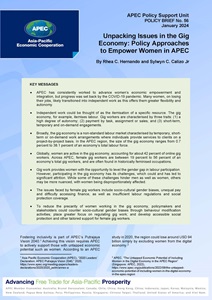Unpacking Issues in the Gig Economy: Policy Approaches to Empower Women in APEC

| Published Date | January 2024 |
|---|---|
| Type of Publication | Reports |
| Publication Under | APEC Secretariat, APEC Policy Support Unit |
| Accessed | 383 |
| Pages | 12 |
| Download publication | Download |
Description
Recognising the economic gravity that women represent, APEC has been consistently working to advance women’s economic empowerment and integration. However, progress in this area was set back by the COVID-19 pandemic, which led many women to transition to independent work that offers flexibility and autonomy. One example is the gig economy that could be seen as a non-standard labour market characterised by temporary, short-term or on-demand work arrangements where individuals, often referred to as gig workers, provide services to clients on a project-by-project basis.
The gig economy varies in size across APEC economies, with women constituting about 19 percent to 56 percent of economies’ total gig workers. Unfortunately, women in online gig work are more inclined to participate in historically feminised occupations, such as clerical and data entry and caregiving. While gig work offers a chance to narrow the gender gap in gainful employment, barriers that affect women disproportionately such as socio-cultural gender biases, discrimination and harassment, unequal pay, and insufficient regulations make this challenging. Indeed, the role of policy should be to reduce the precarity of women working in the gig economy. Thus, policymakers are urged to address these challenges by promoting behaviour modification to overcome socio-cultural gender biases, playing an active role in regulating gig work, and providing accessible social protection or alternative support mechanisms. These policy initiatives would align with APEC’s goal of empowering women in this changing economic landscape.

